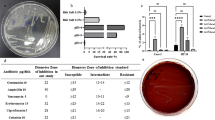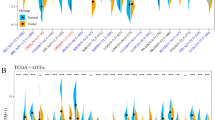Summary
Leucocyte-function-associated antigen-3 (LFA-3) is a cell surface glycoprotein involved in T-cell/ target cell interaction. The expression of LFA-3 on the cell surface was found to be inevitably associated with the expression of HLA molecules. Loss of LFA-3 or HLA proteins on tumour cells might result in ineffective T-cell/target cell interaction and a failure of immunological tumour surveillance. Immunohistochemistry revealed that LFA-3 is expressed in normal colonic epithelium; however, in a minor fraction of colonic adenomas and in 50.3% of colorectal carcinomas LFA-3 expression was reduced or even absent. To investigate whether the presence or absence of LFA-3 in colorectal carcinomas influences the relapse rate and time of tumour-related death, 149 patients who underwent putatively curative surgery were surveyed for a maximum of 65 months (mean 48 months). In contrast to the prognostic role of tumour stage and grade, the presence versus absence of LFA-3 was not correlated with recurrence or survival. Regarding survival and growth of residual tumour cells after potentially curative resection of the initial tumour burden, we conclude that the status of LFA-3 expression in colorectal carcinoma seems to be irrelevant in vivo.
Similar content being viewed by others
References
Barbosa JA, Mentzer SJ, Kamarck ME, Hart J, Biro PA, Strominger JL, Burakoff SJ (1986) Gene mapping and somatic cell hybrid analysis of the role of human lymphocyte function-associated antigen-3 (LFA-3) in CTL-target cell interaction. J Immunol 136:3085–3091
Billaud M, Calender A, Seigneurin J-M, Lenoir GM (1987) LFA-1, LFA-3, and ICAM-1 expression in Burkitt's lymphoma. Lancet 11:1327–1328
Carlon CA, Fabris G, Arslan-Pagnini C, Pluchinotta AM, Chinelli E, Carniato S (185) prognostic correlations of operable carcinoma of the rectum. Dis Colon Rectum 28:47–50
Chapuis PH, Dent OF, Fisher R, Newland RC, Pheils MT, Smyth E, Colquhoun KA (1985) A multivariate analysis of clinical and pathological variables in prognosis after resection of large bowel cancer. Br J Surg 72:698–703
Csiba A, Whitwell HL, Moore M (1984) Distribution of histocompatibility and leucocyte differentiation antigens in normal human colon and in benign and malignant colonic neoplasms. Br J Cancer 50:699–709
Degener T, Momburg F, Möller P (1988) Differential expression of HLA-DR, HLA-DP, HLA-DQ and associated invariant chain (Ii) in normal colorectal mucosa, adenoma, and carcinoma. Virchows Arch [A] 412:315–322
Dukes CE, Bussey HJR (1958) The spread of rectal cancer and its effect on prognosis. Br J Cancer 12:309–320
Durrant LG, Ballantyne KC, Armitage NC, Robins RA, Marksman R, Hardcastle JD, Baldwin RW (1987) Quantitation of MHC antigen expression on colorectal tumours and its association with tumour progression. Br J Cancer 56:425–432
Dustin ML, Selvaraj P, Mattalino RJ, Springer TA (1987) Anchoring mechanism for LFA-3 cell adhesion glycoprotein at membrane surface. Nature 329:846–848
Fisher ER, Sass R, Palekar A, Fisher B, Wolmark N, and contributing national surgical adjuvant breast and bowel project investigators (1989) Dukes′ classification revisited. Findings from the National Surgical Adjuvant Breast and Bowel projects. (Protocol R-01). Cancer 64:2354–2360
Gastrointestinal Tumor Study Group (1984) Adjuvant therapy of colon cancer-results of a prospective randomized trial. N Engl J Med 310:737–743
Gosh AK, Moore A, Street AJ, Howat JMT, Schofield PF (1986) Expression of HLA-D sub-region products on human colorectal carcinoma. Int J Cancer 38:459–464
Gregory CD, Murray RJ, Edwards CF, Rickinson AB (1988) Downregulation of cell adhesion molecules LFA-3 and ICAM-1 in Epstein-Barr virus-positive Burkitt's lymphoma underlies tumor cell escape from virus-specific T cell surveillance. J Exp Med 167:1811–1824
Griffin MR, Bergstrahl EJ, Coffey RJ, Beart RW, Melton LJ (1987) Predictors of survival after curative resection of carcinoma of the colon and rectum. Cancer 60:2318–2324
Hermanek P, Sobin LH (1987) TNM classification of malignant tumors. 4th edn. Springer, Berlin Heidelberg New York, pp 47–49
Hünig T, Tiefenthaler G, Meyer zum Büschenfelde K-M, Meuer SC (1987) Alternative pathway activation of T cells by binding of CD2 to its cell-surface ligand. Nature 326:298–301
Jass JR, Sobin LH (1989) Histological typing of intestinal tumours. 3nd edn. Springer, Berlin Heidelberg New York, pp 32–33
Jass JR, Atkin WS, Cuzick J, Bussey HJR, Morson BC, Northover JMA, Todd IP (1986) The grading of rectal cancer: historical perspectives and a multivariate analysis of 447 cases. Histopathology 10:437–459
Kaplan EL, Meier P (1958) Nonparametric estimation from incomplete observation. Am Stat Assoc J 53:457–480
Knapp W, Dörken B, Gilks WR, Rieber EP, Schmidt RE, Stein H, Borne AEGKr von dem (1989) Leucocyte typing IV. White cell differentiation antigens. Oxford University Press, Oxford, pp 714–720
Krensky AM, Sanchez-Madrid F, Robbins E, Nagy JA, Springer TA, Burakoff ST (1983) The functional significance, distribution, and structure of LFA-1, LFA-2, and LFA-3: cell surface antigens associated with CTL-target interactions. J Immunol 131:611–616
Lopez-Nevot MA, Esteban F, Ferron A, Gutierrez J, Oliva MR, Romero C, Huelin C, Ruiz-Cabello F, Garrido F (1989) HLA class I gene expression on human primary tumours and autologous metastases: demonstration of selective losses of MHC antigens on colorectal, gastric and laryngeal carcinomas. Br J Cancer 59:221–226
Mantel H, Haenszel W (1959) Statistical aspects of the analysis of data from restrospective studies of disease. J Natl Cancer Inst 22:719–748
Mentzer SJ, Smith BR, Barbosa JA, Crimmins MAV, Herrmann SH, Burakoff SJ (1987) CTL adhesion and antigen recognition are discrete steps in the human CTL-target cell interaction. J Immunol 138:1325–1330
Meuer SC, Hussey RE, Fabbi M, Fox D, Acuto O, Fitzgerald KA, Hodgdon JC, Protentis JP, Schlossman SF, Reinherz EL (1984) An alternative pathway of T-cell activation: a functional role for the 50 kd T11 sheep erythrocyte receptor protein. Cell 36:897–906
Minsky BD, Mies C, Rich TA, Recht A, Chaffey JT (1988) Potentially curative surgery of colon cancer: patterns of failure and survival. J Clin Oncol 6:106–118
Moertel OG, Fleming TR, Macdonald JS, Haller DG, Laurie JA, Goodman PJ, Ungerleider JS, Emerson WA, Tormey DC, Glick JH, Veeder MH, Maillard JA (1990) Levamisole and fluorouracil for adjuvant therapy of resected colon carcinoma. N Engl J Med 322:352–358
Möller P, Momburg F, Koretz K, Moldenhauer G, Herfarth C, Otto HF, Hämmerling GJ, Schlag P (1991) Influence of major histocompatibility complex class I and II antigens on survival in colorectal carcinoma. Cancer Res 51:729–736
Momburg F, Degener T, Bachus E, Moldenhauer G, Hämmerling GJ, Möller P (1986) Loss of HLA-A,B,C andde novo expression of HLA-D in colorectal cancer. Int J Cancer 37:179–184
Mortarini R, Belli F, Parmiani G, Anichini A (1990) Cytokine mediated modulation of HLA-class II, ICAM, LFA-3 and tumor-associated antigen profile of melanoma cells. Comparison with anti-proliferative activity by rIL1-β, rTNF-α, rIFN-γ, IL4 and their combinations. Int J Cancer 45:334–341
Newland RC, Chapuis PH, Smyth EJ (1987) The prognostic value of substaging colorectal carcinoma. A prospective study of 1117 cases with standardized pathology. Cancer 60:852–857
Nouri AME, Smith MEF, Crosby D, Oliver RTD (1990) Selective and non-selective loss of immunoregulatory molecules (HLA-A,B,C antigens and LFA-3) in transitional cell carcinoma. Br J Cancer 62:603–606
Peterson A, Seed B (1987) Monoclonal antibody and ligand binding sites of the T cell erythrocyte receptor (CD2). Nature 329:842–846
Recny MA, Neidhardt EA, Sayre PH, Ciardelli TL, Reinherz EL (1990) Structural and functional characterization of the CD2 immunoadhesin domain. Evidence for inclusion of CD2 in anα- β protein folding class. J Biol Chem 265:8542–8549
Richardson NE, Chang H-C, Brown NR, Hussey RE, Sayre PH, Reinherz EL (1988) Adhesion domain of human T11 (CD2) is encoded by a single exon. Proc Natl Acad Sci USA 85:5176–5180
Sanchez-Madrid F, Krensky AL, Ware CF, Robbins E, Strominger JL, Burakoff SJ, Springer TA (1982) Three distinct antigens associated with human T-lymphocyte-mediated cytolysis: LFA-1, LFA-2, and LFA-3. Proc Natl Acad Sci USA 79:7489–7493
Seed B (1987) An LFA-3 cDNA encodes a phospholipid-linked membrane protein homologous to its receptor CD2. Nature 329:840–842
Seed B, Aruffo A (1987) Molecular cloning of the CD2 antigen, the T-cell erythrocyte receptor, by a rapid immunoselection procedure. Proc Natl Acad Sci USA 84:3365–3369
Shaw S, Ginther Luce GE (1987) The lymphocyte function-associated antigen (LFA)-1 and CD2/LFA-3 pathways of antigenindependent human T cell adhesion. J Immunol 139:1037–1045
Shaw S, Ginther Luce GE, Quinones R, Gress RE, Springer TA, Sanders ME (1986) Two antigen-independent adhesion pathways used by human cytotoxic T-cell clones. Nature 323:262–264
Smith MEF, Marsh GE, Bodmer JG, Gelsthorpe K, Bodmer WF (1989) Loss of HLA-A,B,C allele products and lymphocyte function-associated antigen 3 in colorectal neoplasia. Proc Natl Acad Sci USA 86:5557–5561
Stähle E, Glimelius B, Bergström R, Pählman L (1989) Preoperative prediction of outcome in patients with rectal and rectosigmoid cancer. Cancer 63:1831–1837
Stein B, Momburg F, Schwarz V, Schlag P, Moldenhauer G, Möller P (1988) Reduction or loss of HLA-A,B,C antigens in colorectal carcinoma appears not to influence survival. Br J Cancer 57:364–368
Takai Y, Reed ML, Burakoff SJ, Herrmann SH (1987) Direct evidence for a receptor-ligand interaction between the T-cell surface antigen CD2 and lymphocyte-function-associated-antigen 3. Proc Natl Acad Sci USA 84:6864–6868
Van den Ingh HF, Ruiter DJ, Griffioen G, Muijen GNP van, Ferrone S (1987) HLA antigens in colorectal tumours — low expression of HLA class I antigens in mucinous colorectal carcinomas. Br J Cancer 55:125–130
Wiggers T, Jeekel J, Arends JW, Brinkhorst AP, Kluck HM, Luyk CI, Munting JDK, Povel JACM, Rutten APM, Volovics L, Greep JM (1988a) No-touch isolation technique in colon cancer: a controlled prospective trial. Br J Surg 75:409–415
Wiggers T, Arends JW, Schutte B, Volovics L, Bosman FT (1988b) A multi variate analysis of pathologic prognostic indicators in large bowel cancer. Cancer 61:386–395
Author information
Authors and Affiliations
Additional information
Dedicated to Prof. G. Seifert at the occasion of his 70th birthday
Rights and permissions
About this article
Cite this article
Koretz, K., Schlag, P. & Möller, P. Sporadic loss of leucocyte-function-associated antigen-3 (LFA-3) in colorectal carcinomas. Vichows Archiv A Pathol Anat 419, 389–394 (1991). https://doi.org/10.1007/BF01605072
Received:
Revised:
Accepted:
Issue Date:
DOI: https://doi.org/10.1007/BF01605072




